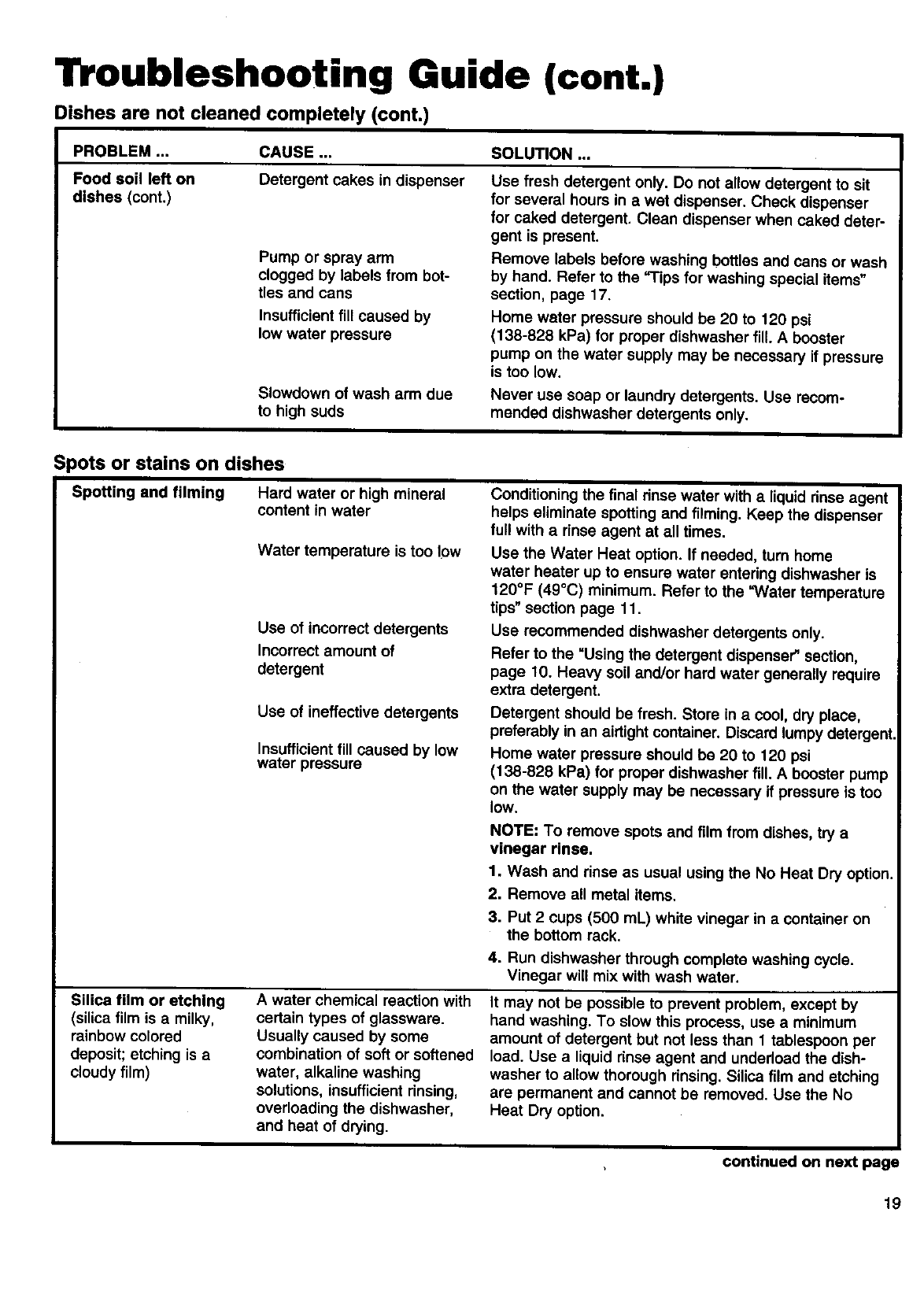
Troubleshooting Guide (cont.)
Dishes are not cleaned completely (cont.)
PROBLEM ...
Food soil left on
dishes (cent.)
CAUSE... SOLUTION...
Detergent cakes in dispenser
Pump or spray arm
clogged by labels from bot-
tles and cans
Insufficient fill caused by
low water pressure
Slowdown of wash arm due
to high suds
Use fresh detergent only. Do not allow detergent to sit
for several hours in a wet dispenser. Check dispenser
for caked detergent. Clean dispenser when caked deter-
gent is present.
Remove labels before washing bottles and cans or wash
by hand. Refer to the "Tips for washing special items"
section, page 17.
Home water pressure should be 20 to 120 psi
(138-828 kPa) for proper dishwasher fill. A booster
pump on the water supply may be necessary if pressure
is too low.
Never use soap or laundry detergents. Use recom-
mended dishwasher detergents only.
Spots or stains on dishes
Spotting and filming
Hard water or high mineral
content in water
Water temperature is too low
Use of incorrect detergents
Incorrect amount of
detergent
Use of ineffective detergents
Insufficient fill caused by low
water pressure
Conditioning the final rinse water with a liquid rinse agent
helps eliminate spotting and filming. Keep the dispenser
full with a rinse agent at all times.
Use the Water Heat option. If needed, turn home
water heater up to ensure water entering dishwasher is
120°F (49°C) minimum. Refer to the "Water temperature
tips" section page 11.
Use recommended dishwasher detergents only.
Refer to the =Using the detergent dispenser" section,
page 10. Heavy soil and/or hard water generally require
extra detergent.
Detergent should be fresh. Store in a cocl, dry place,
preferably in an airtight container. Discard lumpy detergent.
Home water pressure should be 20 to 120 psi
(138-828 kPa) for proper dishwasher fill. A booster pump
on the water supply may be necessary if pressure is too
low.
NOTE: To remove spots and film from dishes, try a
vinegar rinse.
1. Wash and rinse as usual using the No Heat Dry option.
2. Remove all metal items.
3. Put 2 cups (500 mL) white vinegar in a container on
the bottom rack.
4. Run dishwasher through complete washing cycle.
Vinegar will mix with wash water.
Silica film or etching
(silica film is a milky,
rainbow colored
deposit; etching is a
cloudy film)
A water chemical reaction with
certain types of glassware.
Usually caused by some
combination of soft or softened
water, alkaline washing
solutions, insufficient rinsing,
overloading the dishwasher,
and heat of drying.
It may not be possible to prevent problem, except by
hand washing. To slow this process, use a minimum
amount of detergent but not less than 1 tablespoon per
load. Use a liquid rinse agent and underload the dish-
washer to allow thorough rinsing. Silica film and etching
are permanent and cannot be removed. Use the No
Heat Dry option.
continued on next page
19
